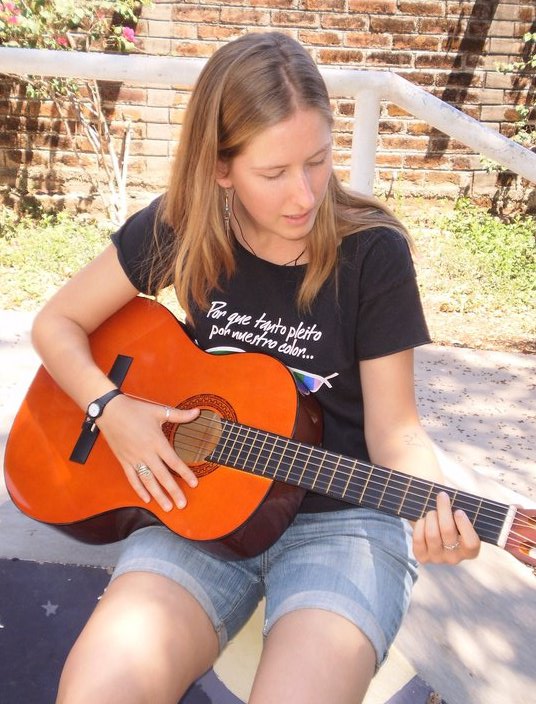The area that Suchitoto encompasses was the locale of seven massacres during the civil war, including one in the town of Copapayo. We went to the actual site of the massacre, in which 150 people were killed by the military troops of General Monterosa (trained at the School of the Americas). We heard the testimony of the only survivor of the actual massacre. [To expain, many people fled by getting into boats and leaving on the lake/reservoir, but only one man, who was 9 years old at the time, survived of the people who were on the hillside when the military discovered the community.]
At the site, Peggy expained a bit of what happened and events that led up (the military harassment and small-scale attacks that led the community to vacate their homes). She said that the tradition, when visiting the site, is to take a few moments of silence to re-dedicate ourselves to peace, so that there will be no more Copapayos, no more massacres, and that those places that exist in violence today might know peace. So let us all take a moment to re-dedicate ourselves to this struggle and this vision.
As part of our course, we spent the last week working in small groups with books that look at more specific aspects of liberation. Rebekah and I took a book called Soul Sisters, which put poetry to a set of icons drawn of women of the New Testiment. We then used our experiences and interactions with Central American women, as well as women of the bible, to write our own poems. I'm not, by any means, a poet. But here is my product.
In her day, as in ours, “adultery”
only meant anything if a
woman had strayed.
Vilma knows this
all too well. Her mother
had no men on the side;
her father had plenty of women.
No wrong was seen.
So a childhood of poverty,
after father’s flight,
ensued. Mother,
always loving, had to be
convinced that her child was not
hungry, despite days without
food.
The girl grew up, swearing
to break cycles and avoid repeating
history. Yet cycles are strong
and patterns easy to repeat. And
so three generations of faithful women –
representing entire communities of their sisters –
are left or infected by non-“adulterous” men.
In her day, as in ours, children
were all too often placed at the
bottom of the priority list –
daughters with particular ease.
Chata knows this, abandoned
by father and struck by mother’s
death. Yet she has the same
fortune as the daughter of Jairus –
a community enamoured of its
children, its future.
Just as the healer said “fear is
useless,” you, Chata, are fearless.
Only girl on the futbol team,
hiking,
joking,
vice-president-organizing
force of spirit.
Pride of her community.
Daniel also knows this love. Not
a daughter, but a young, deaf
son in a place where this affords
few options.
Easily relegated to the least
position, but child of parents who
refuse to do so.
The pride in father’s eyes as
you heal yourself through
weaving and learning is
more than enough to put an end to
pity.
In her day,
as during the war,
as in ours, mothers bore
children; mothers raised
children. Mothers, with too much
frequency, outlive their
children.
Mothers across
know this to be wrenchingly,
profoundly,
terribly true.
They share in the benchmark –
and the day-to-day – experiences of
la
Life under repressive occupation;
labor in surroundings that
emphasize the depths of
poverty possible in this creation. Sacrifice.
They raise children who learn to
question the need for this
suffering.
They raise children who
raise people to from their knees
to their feet in pride, and sometimes,
back to their knees
in awe.
And as a result,
(because we know how the
story ends, because cycles are
strong and hard to break)
they raise children called ‘subversive,’
children who must live as refugees, and
children killed for the
danger they pose to systems and cycles which
deny and attack the existence of life.
In their day, as in ours,
women encounter their God on the
road – to
to and from the tomb. Yet
despite their travails – and their
victories – these sisters hear and draw power
from the words “do not seek among the dead for those who
live.”
